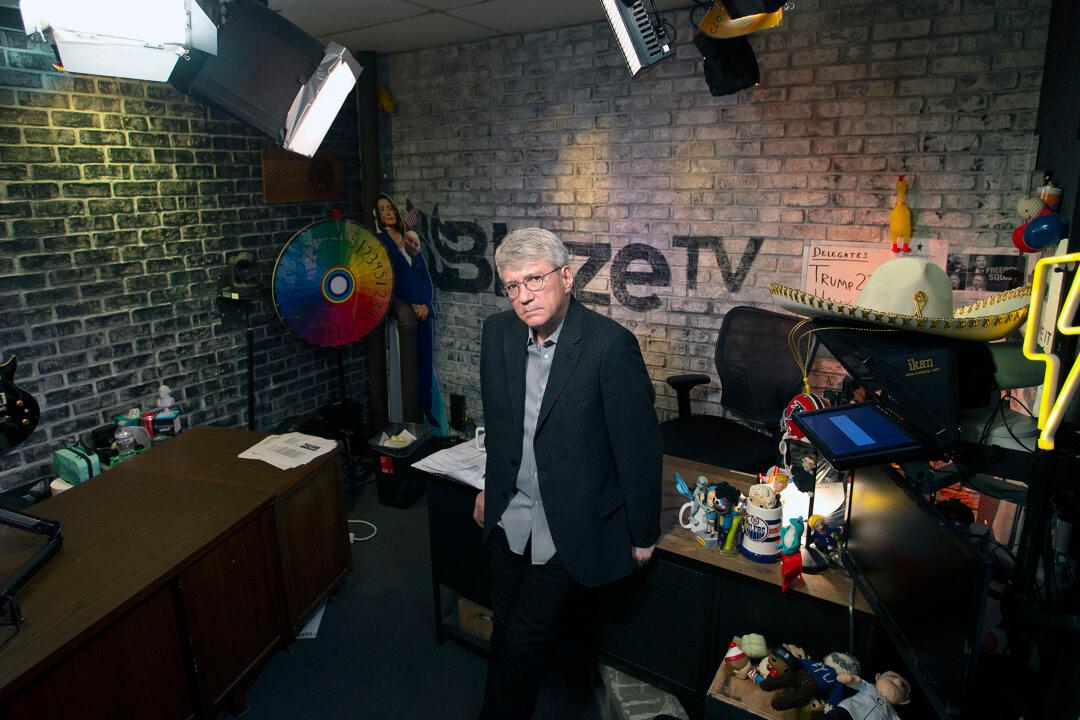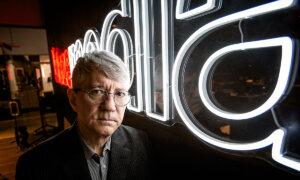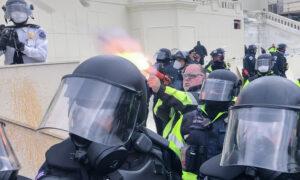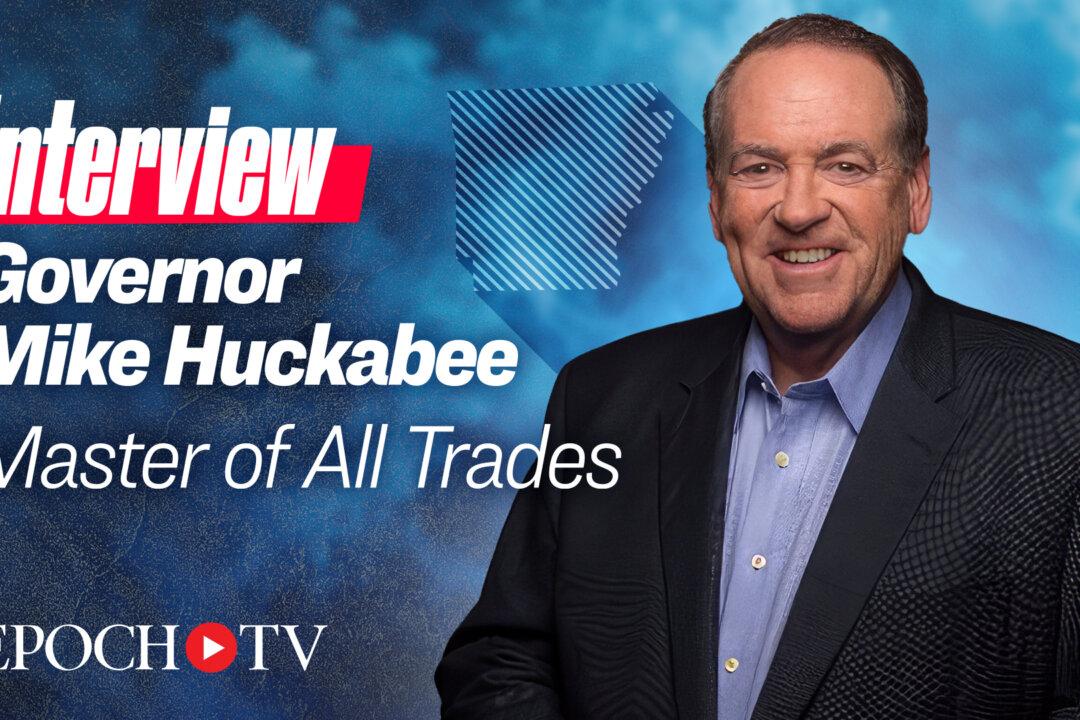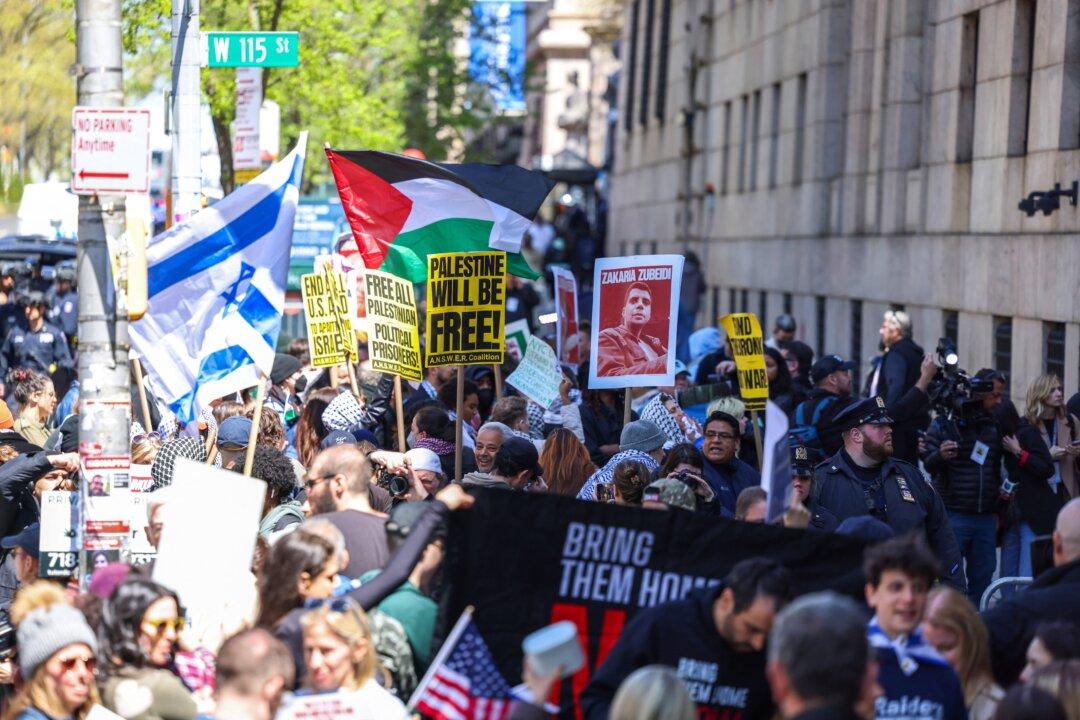Commentary
We used to think it was elsewhere—the Soviet Union, Nazi Germany, communist China.
But something happened in this country, as Ernest Hemingway said of bankruptcy, “gradually, then suddenly.”
Many now believe we are living in a new form of tyranny here in the USA.
The fate of independent journalist (now with The Blaze) Steve Baker is a terrifying illustration of where we are today in the land founded on the principle of freedom of speech.
Mr. Baker was inside the U.S. Capitol on Jan 6, 2021, as a journalist doing the usual note-taking and videoing of what was occurring, nothing remotely violent, only to find himself having been treated by our Justice Department as some kind of “insurrectionist” to a degree that he was placed for a time in irons.
After now years of threats to prosecute him, Mr. Baker has finally been summoned to appear Wednesday, April 3, at the U.S. District Court in Washington to answer a criminal complaint on four code violations similar to those that have led to the incarceration of many Jan. 6 defendants. They are:
18 U.S.C. § 1752(a)(1) - Knowingly Entering or Remaining in any Restricted Building or Grounds Without Lawful Authority,
18 U.S.C. § 1752(a)(2) - Disorderly and Disruptive Conduct in a Restricted Building or Grounds,
40 U.S.C. § 5104(e)(2)(D) - Disorderly Conduct in a Capitol Building,
40 U.S.C. § 5104(e)(2)(G) - Parading, Demonstrating, or Picketing in a Capitol Building.
Mr. Baker could actually now do jailtime for being a reporter—in the USA.
It’s more than worth noting journalists from several mainstream media organs, including their mother ship, The New York Times, were inside the Capitol reporting at the same time as Mr. Baker.
None of them have been asked to answer a criminal complaint or anything similar for their activities that day. This is likely because their reporting mostly adhered to what has been called “the party line” while Mr. Baker wrote and videoed what he saw.
As one who has earned his living as a writer all my life, the implications of Mr. Baker’s case alarmed and continue to alarm me.
We became acquainted through a mutual friend a while ago. I interviewed Mr. Baker—whom I consider a hero of our time—the week of March 25 in Nashville. What follows has been slightly edited for brevity and clarity.
Just Who Is a Journalist?
Mr. Simon: Steve, let’s start with the real question, I think, that arises out of a lot of what your problem is and what was done. What would you say is a journalist, and how would you define a journalist in 2024? And consequently, how did the FBI and our betters define a journalist?Mr. Baker: It’s a hard question. In some people’s minds, especially, apparently, the FBI and the Department of Justice, they still want to pigeonhole and operate off of the old notion that you need to either work in a newsroom at a newspaper or you need to work for one of the major media sources.
More importantly, especially as it relates to Jan. 6, it seems that you need to work for one of the approved sources, a source that operates and disseminates the approved narrative.
But it gets much more complicated than that, I think, because today, it only requires a cellphone camera and an internet connection for you to allow your voice to be heard by millions of people.
And you know, I make this comparison at the time that I showed up in DC on Jan. 6, I had tens of thousands of followers of my blog and my social media accounts, making me a larger publisher of information and commentary and analysis than most of 90-plus percent of the nation’s newspapers.
Mr. Simon: It’s a safe assumption. In fact, the newspaper that I wrote for a fair amount in my youth, the Los Angeles Times, is close to disappearing. But how do we break through? If the government controls information, as it seems to want to do, that places people like you at a continual risk in doing what you’re doing, right?
Mr. Baker: Regarding my journalism on Jan. 6, the first critic, the first criticism they’re going to throw out, or the first question they’re going to ask, which is a leading question to their criticism, is, were you credentialed on that day? This might have been in other times because at least you were answering to an editor of some sort. There was a process to make sure their work was somewhat decent, you know, and filtered and accurate and they had ombudsman to be sure that they didn’t get themselves in any legal jeopardy. But the journalism of today is, I think, it’s more pure. I think it’s more akin to the journalism of our founding of this nation at the time. You didn’t need a credential or a license or a press pass, or to work for anybody to publish a pamphlet. Like Thomas Paine.
Mr. Simon: We read Thomas Paine today, but nobody reads much journalism from 20 or 30 years ago.
Mr. Baker: Look who’s garnering the biggest readership. It’s bloggers and podcasters.... The first credential I ever was given was for a Ryder Cup event in Spain because I was able to show them I had a track record of writing in the early days of the internet—CompuServe, AOL, Prodigy. I think the other thing most interesting to state is that there is no legal requirement to have a press pass to cover anything.... Now there is a—for instance, if you want to cover the Congress, the House of Representatives, or the Senate from the gallery, there is a congressional press pass that you can apply for. But it’s not a legal issue. It’s controlled by a certain group, as is the White House press room, right?
Having said that, that does not prevent me from covering an event on the Capitol steps. It doesn’t even prevent me from going inside any of the congressional offices and knocking on the door of the congressman and saying, ‘May I speak to Congressman so-and-so about such-and-such legislation?’ I don’t need the flashy press badge in order to do that.
But this is the one thing, Roger, that is most confusing, let’s say, to the average person and looking out at this from afar or not associated with the law or anything surrounding journalism: When the FBI asked me if I was credentialed that day, I said, ‘Yes. By the First Amendment.’
Mr. Simon: What did they say to that?
Mr. Baker: They just kind of, you know, shrugged.
Relations With the Mainstream Media
Mr. Simon: How were your relations with MSM reporters covering Jan. 6?Mr. Baker: I don’t want to out him because he is a colleague, and this was an off-the-record conversation, but I will tell you that I was speaking with a two-time Pulitzer Prize winning journalist for a major D.C. media source talking about some of the cases that I’ve been working on in terms of my investigations related to Jan. 6, and he actually said this to me: He said, “Why don’t we know this?” And I said, “Because you’re not allowed to ask the questions.” That’s the difference in journalism between the major media sources today and independents. I don’t have to play by that set of narrative rules.
Mr. Simon: You know, it’s interesting, because on the face of it, this sort of resembles the Soviet Union. Both of us have visited and we can segue into that. But my question to you is it seems to me that the system here could ultimately be more dangerous than the Soviet Union.
Mr. Baker: By the time I stepped into the Soviet Union, the first time in 1981, [Leonid] Brezhnev was still the chairman of the Communist Party and the head of the Politburo. They had 60 years—at least their journalists, their writers, their media—people had 60 years of training of knowing exactly what the lines were. And they dared not cross them. That is what we’re dealing with here today that you’re talking about. A writer named Luke Morgensen who was a freelancer submitted his story to the New Yorker. He actually entered the building through a broken window. He had his cell phone as this [was] what he called his reporter’s notebook, which he used to take notes and to record video, He submitted his story to the New Yorker and his “Get Out of Jail Free” card was essentially this. The title of his article was “Among the Insurrectionists.” That was direct. If he had put air quotes around it, he would have been in jail.
Mr. Simon: Have you reached out to Morgensen?
Mr. Baker: I’ve reached through a couple of sources obviously. I’ve tried to reach him through The New York Times. I’m trying through The New Yorker, but also I was able to find a personal email address on him and I sent him a really nice introduction to myself and told him I would like to talk to him and never received a response back.
Mr. Simon: So in a way these people who work for the MSM seem to fear you. You don’t strike me as a hostile person.
Mr. Baker: I’m not hostile. And through my coverage of some of the Jan. 6 trials, I have entered into what I would call collegial friendly relationships, but not necessarily friends, with several individuals, whether they’re New York Times, Washington Post, BBC in USA, CNN, several journalists who are very kind to me and talk to me in the hallways of the district courthouse. Some of them come to me. I mean, you know, they come up to me and sit down beside me and in initiate a conversation. It’s never contentious, but I’m always wary of why, what they are wanting to know from me?
I‘ll give you [an example]. I had been covering the Oath Keepers trial back in October of 2022. And I had already been there for several weeks. It was a nine-weeklong trial and I think sometime in the third or fourth week of the trial. Ryan Riley from NBC News is also there in the courthouse every day covering this trial. I’d seen him but we had not spoken, not been introduced. But we had our lunch break. He came up and sat down behind me in the media room where we were getting the video and audio feed from the courtroom. And he sat down behind me and he said, “Hi, my name is Ryan Riley with NBC News, and I’ve been reading some of your stuff and following some of your coverage.”
And he said, “So tell me, why haven’t you been indicted yet?” And they were the first words he ever said to me. And my response to him was, “Well, usually I get dinner and a couple of drinks before I’m asked to bed,” you know, but that was his introduction to me. And this has been, well, a year and a half ago now. We’ve had lengthy conversations, most of them are off the record, although he did interview me after my arrest and actually updated his article and allowed me to comment on his article after my arrest and we’ve shared some information about our own investigations and research into certain Jan. 6-related characters.
We’ve had a very friendly, collegial relationship, but I don’t believe for a moment that he’s going to ride in on the white horse at my trial and come to my defense as a colleague. I just don’t believe that that’s going to happen. I don’t think that—whether it’s NBC, The New York Times, The Washington Post or any of that ilk, or any of the DC base correspondents—[they’re] going to do that because they’re not allowed to, regardless of their personal feelings.
His Tucker Interview
Mr. Simon: Many of us watch Tucker Carlson’s often riveting interviews on X and on his own site. He recently interviewed you, but you expressed some dissatisfaction. What was that?Mr. Baker: I was obviously thrilled to be able to speak to Tucker’s audience. I was thrilled that he gave voice to my case, and allowed me to share that his producers had asked for me to submit a talking points memorandum to them that they could go by and, and then also asked me to update them on all the work. So, from the time that they first approached me to the time that I actually did the interview was over a month. So I was able to forward to them stories, articles, videos that we’ve been producing through The Blaze relating to the investigations that I’ve been doing about Jan. 6, and some of those were rather significant stories.
And so, I was hoping that during this process, that I would be able to have, you know, a minute to have that larger audience be aware of the work that we’re doing, particularly against the weaponized Department of Justice, FBI, and the corruption at the United States Capitol Police, which I’ve spent a lot of time on. And so I was expecting that that would happen. But they did say that Tucker wanted to definitely lead with my story, the story of my arrest, and the circumstances around that. That’s where he wanted to begin. So that’s where we began and that’s drama, that’s fine. And, again, I’m thankful to have had the opportunity to share that with his audience.
And then at the end of the 15 minutes of focus on my story, I was fully anticipating the next question to take me into some of the work that I’ve done, that has brought me up to this point, and maybe even be responsible for my arrest. And so, all of a sudden, Tucker says, “Steve, I mean, it’s just, it’s unbelievable. Thank you for being with me today.”
So I was caught off guard in that moment, not being able to share that, and I wasn’t the only one that noticed that.
Views expressed in this article are opinions of the author and do not necessarily reflect the views of The Epoch Times.
